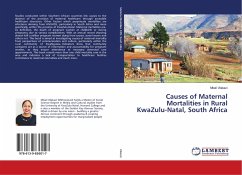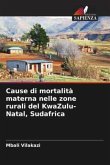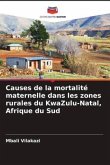Studies conducted within Southern African countries link causes to the absence of the provision of maternal healthcare through accessible healthcare structures. Other factors which perpetuate mortalities are infections deriving from HIV/AIDS, particularly in South Africa and more specifically, within the province of KwaZulu-Natal. Maternal mortalities are, by definition, the death of pregnant women at childbirth or during pregnancy due to various complications. With an annual record showing almost half a million pregnant women dying from causes, some known and others not. This book is aimed at investigating causes of maternal mortality from perspectives of communication and culture, particularly within the rural community of KwaNyuswa. Indicators show that community caregivers act as a source of information and accountability for pregnant women, as they ensure attendance at necessary antenatal care appointments. This book reveals more than one child mortality case in the area andindicates a lack of transportation to healthcare facilities contributes to maternal mortalities and much more.








